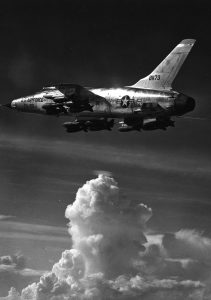10 August 1961: A Republic F-105 Thunderchief lifted the largest load ever carried aloft by a single-engine aircraft when it carried a payload of over 14,000 pounds (6,350.3 kilograms) during a test.

The Thunderchief is the largest single-seat, single-engine aircraft ever built. It was a Mach 2 fighter-bomber, designed for NATO defensive tactical nuclear strikes with a nuclear bomb carried in an internal bomb bay. It is best known, though, as a fighter bomber used in the Vietnam War. Because of its very high speed, it was employed as a “Wild Weasel”, attacking surface-to-air missile sites.
Republic Aviation Corporation built 833 F-105 Thunderchief fighter bombers at its Farmingdale, New York factory. 610 of those were single-seat F-105Ds. The F-105D Thunderchief was 64 feet, 3 inches (19.583 meters) long (excluding pitot boom) with a wingspan of 34 feet, 11 inches (10.643 meters), and overall height of 19 feet, 8 inches (5.994 meters). It had an empty weight of 26,622 pounds (12,076 kilograms) and a maximum takeoff weight of 50,511 pounds (22,911 kilograms).
The F-105D wings were swept 45° at 25% chord. The angle of incidence was 0° and there was no twist. The wings had 3° 30′ anhedral. The total wing area was 385 square feet (35.8 square meters).
The Thunderchief was powered by one Pratt & Whitney J75-P-19W engine. The J75 is a two-spool axial-flow afterburning turbojet with water injection. It has a 15-stage compressor section (8 low- and 7 high-pressure stages) and 3-stage turbine section (1 high- and 2 low-pressure stages.) The J75-P-19W is rated at 14,300 pounds of thrust (63.61 kilonewtons), continuous power; 16,100 pounds (71.62 kilonewtons), Military Power (30-minute limit); and Maximum Power rating of 24,500 pounds (108.98 kilonewtons) with afterburner (15-minute limit). The engine could produce 26,500 pounds of thrust (117.88 kilonewtons) with water injection, for takeoff. The J75-P-19W is 21 feet, 7.3 inches (6.586 meters) long, 3 feet, 7.0 inches (1.092 meters) in diameter, and weighs 5,960 pounds (2,703 kilograms).
The maximum speed of the F-105D was 734 knots (845 miles per hour/1,360 kilometers per hour)—Mach 1.11—at Sea Level, and 1,210 knots (1,392 miles per hour, 2,241 kilometers per hour)—Mach 2.11—at 35,000 feet (10,668 meters). The combat ceiling was 51,650 feet (15,743 meters) and maximum unrefueled ferry range was 1,928 nautical miles (2,218 statute miles/3,571 kilometers).
The F-105D was armed with one 20 mm M61A1 Vulcan rotary cannon and 1,028 rounds of ammunition. It had an internal bomb bay and could carry bombs, missiles or fuel tanks on underwing and centerline hardpoints. The maximum bomb load consisted of sixteen 750-pound (340 kilogram) bombs. For tactical nuclear strike missions, the F-105D could carry one Mk-28 “special store” in the internal bomb bay.
The F-105 Thunderchief was designed as a supersonic tactical fighter bomber rather than an air superiority fighter. Still, during the Vietnam War F-105s shot down 27 enemy MiG fighters. 24 of those were shot down with the Thunderchief’s Vulcan cannon.
Of the 833 F-105s, 395 were lost during the Vietnam War. 334 were shot down, mostly by antiaircraft guns or missiles, and 17 by enemy fighters. Another 61 were lost due to accidents. The 40% combat loss is indicative of the extreme danger of the missions these airplanes were engaged in. (1)
(1) Source: Thanks to Bryan R. Swopes, This Day in Aviation, c. 2020
